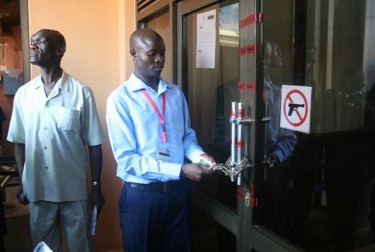Uganda has allowed two newspapers to reopen after an 11-day standoff between the government and the media houses over a controversial letter they had obtained that referred to a plot to groom the eldest son of President Yoweri Museveni to succeed the 27-year leader.
Police shut down the Red Pepper and the Daily Monitor on 20 May, 2013 after they reported on a letter written by the country's coordinator of intelligence services to the head of the counter intelligence agency asking for an investigation into the succession plan, known as the Muhoozi Project, and allegations that opponents of the plan are targeted for assassination.
The closure of the Daily Monitor also affected two radio stations, 90.4 Dembe FM and 93.3 KFM, which are located in the same building in the Namuwonga suburb of Uganda's capital city of Kampala.
While the newspapers were shuttered, there were demonstrations throughout the country in support of media freedom. Ugandan police reacted by using tear gas and arresting some protestors.
On 26 May, 2013, the president met with management of the Nation Media Group, which owns the Daily Monitor, to discuss the matter. The government released a statement afterwards saying that the Nation Media Group “highly regretted the story that led to the closure of the Monitor newspaper and KFM and Dembe Radio stations,” and that had agreed to “only publish or air stories which are properly sourced, verified and factual.”
Five days later, the media houses were reopened and allowed to resumed their work.

Head of security at Daily Monitor opens the door after the reopening. Photo from Daily Monitor official Facebook page
After the media houses were opened, the Daily Monitor said in an editorial that they were delighted to be back as the closure caused difficulties for staff, families, distributors, vendors, and many others. They emphasised that a free press is essential if a country hopes to grow peacefully.
However, many people still think the government mishandled the situation and the closure of the media houses set a bad precedent for the future of press freedom in the Uganda.
Ugandan journalist and blogger Mugumya wrote on his blog that the 11 days the media houses were shut down were the darkest period ever for media in Uganda:
But I would like to make a few things clear. Contrary to what many have said on social media, the undertakings made by the several media organizations do not weaken the media in Uganda.
The siege weakened the media but the damage is largely financial and is not fatal.
It’s not situations like the Media Siege that kill companies, it’s the lack of them and the failure for those affected to learn lessons.
I am confident there is no media house that will find it financially difficult to recover quickly from the hiccup.
The undertakings with government on the other hand give the media a new life, they don’t weaken the media in Uganda at all.
I have read all the undertakings and there is nothing that wasn’t in the editorial policies already.
He noted:
The police has too much power and the courts are almost powerless.
This was very clear during the siege.
What I found very strange is not that the police sealed off our offices.
The Police Act gives them the powers, the authority to do just that.
What I found very surprising, very strange indeed and very disturbing is that the police can seal off a facility for close to two weeks, do an intensive search and not prefer any charges against anyone and then walk away like nothing happened and that is very acceptable in our country.
Commenting on the Daily Monitor website, Mukiibi Mugerwa wanted to know whether the Daily Monitor was forced into submission by the government:
I have read this whole thing and to be honest, for the very first time I don't know what you are trying to say!. Is the blurring of messages part of your new editorial policy?. Have you been so beaten into submission that you can only communicate in hidden messages? . You should have been very bold and stated the “For 11 days and 11 nights, the Monitor and the Government stared each other in the face, and yes, it is the Government who blinked”
Another reader, Charles Kintu, expressed his doubt:
“We will remain fair and accurate” I doubt it not with the draconian and stringent conditions you have signed.
On Twitter, user @twsgy wrote:
@twsgy: #mediasiege come to thinK [about] it, #monitor&pepper committed crimes under the #officialsecretsAct dont police know that they [are] repugnant
Official Secrets Act of 1964 is a piece of legislation that, among other things, make it difficult for government sources to release information to journalists. A World Bank report shows that the Official Secrets Act poses major challenges to the Access to Information Act in Uganda.
The question still remains, as Ugandan journalist Mugumya asked on his blog while discussing the siege, “Could this be the new normal in Uganda?”







1 comment